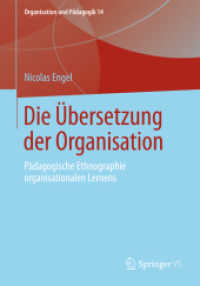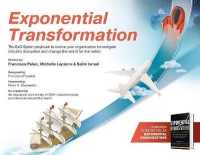Full Description
Political Discourse Analysis addresses the challenges facing political actors at all levels of society and across a range of regimes. It shows how discursive legitimisation strategies can vary on a continuum ranging from the stabilising effects of institutional discourse and the management of destabilising factors inherent in new types of media to the destabilising potential of rhetorical devices and deliberate de-legitimisation strategies used to attack opponents.
The diverse approaches show how political actors strive to maintain control in the context of democratic deficit and crisis in developed societies while addressing growing global threats to stability in all regimes. While many actors seek legitimisation through the institutional structure, media or rhetoric, others may seek to weaken any opposition to them through de-legitimisation. In this collection Butler provides the reader with replicable methods that can be adapted to political contexts.
Contents
Acknowledgements
List of Figures
List of Tables
Notes on Contributors
Preface
Introduction: Legitimisation strategies for a de-legitimised political world, Robert Butler
PART I: The role of legitimisation in institutional contexts
1. Education and political socialisation in contemporary China: From institutional discourse to teaching materials, Chiara Bertulessi
2. Smoothing processes in United Nations discourse on violence against women: A diachronic perspective, Célia Atzeni
3. Who calls whom a populist? A pragmatic analysis of the uses of populism(s) and populist(s) in French and Spanish parliamentary debates, Nadezda Shchinova
4. The Brexit Saga: Stancetaking, Control and Identity in Political Discourse, Juana I. Marín-Arrese
PART II: Legitimisation and new media
5. Political discourse and the new media: New architectures of communication, Mariya Chankova
6. Meaning-making in Trump's anti-Biden political campaign commercials: Multimodal perspective, Tetiana Krysanova
PART III: Legitimisation strategies and conceptualisation
7. A critical analysis of figurative language in the political discourse of conflict in Africa, Issa Kanté
8. The Card Metaphor 'Play the X Card' as a Social Practice and its Pragmatic Functions, Yuuki Tomoshige
9. Metaphors and political arguments in environmental debates: 'Our house is still on fire', Anaïs Augé
Concluding remarks: Towards Legitimisation Studies in contemporary crises, Robert Butler and Anaïs Augé








